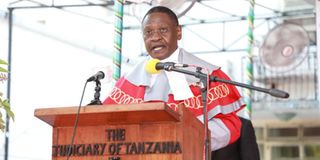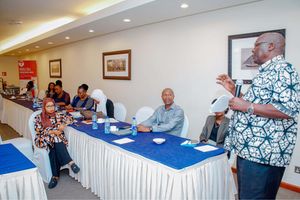Prime
CJ tenure: Constitution the source of confusion, say legal stakeholders

The current Chief Justice, Prof. Ibrahim Juma, has attained the retirement age of 65. PHOTO | COURTESY
What you need to know:
- The debate stems from reports that President Samia Suluhu Hassan has extended Prof Juma’s tenure, a decision that has been opposed by some legal stakeholders, including Court of Appeal judge Stella Mugasha.
Dar es Salaam. The debate on Chief Justice Ibrahim Juma’s tenure continued to rage yesterday, with stakeholders saying the relevant provisions in the current Constitution were a source of confusion.
The debate stems from reports that President Samia Suluhu Hassan has extended Prof Juma’s tenure, a decision that has been opposed by some legal stakeholders, including Court of Appeal judge Stella Mugasha.
Justice Mugasha reportedly wrote to Chief Court administrator Elisante Ole Gabriel, protesting what she says is violation of the Constitution.
The letter – which was copied to President Hassan, Prof Juma, Justice of the Court of Appeal Augustine Mwarija, Principal Judge Mustapher Siyani, Attorney General Eliezer Feleshi and Chief Secretary Moses Kusiluka – raises several concerns.
Dr Felshi confirmed to The Citizen’s stablemate Mwananchi in Dodoma yesterday that he had received the letter, but had not yet read it.
“I would like to ask for time to read it first because it was sent to my main office here in Dodoma, but during this parliamentary sitting, I’m conducting all my activities in my office here at Parliament buildings," he said.
Earlier this week, Justice Stella confirmed when speaking to Mwananchi that the letter was indeed hers, stating, however, that she wrote it to the intended recipients and not for social media or newspapers.
The basis of Justice Stella's argument is the requirement of the Constitution’s Article 120(1), which states, “Every Justice of Appeal shall vacate his office upon attaining the age of sixty-five, but the provisions of this subarticle shall apply subject to the subsequent provisions of this Article.”
However, President Samia's decision is based on Article 120(3) of the Constitution, which grants the Head of State the authority to extend the tenure of a Judge of the Court of Appeal even after reaching the retirement age if it is deemed beneficial to the public.
The Article states that, “In the event that the President considers it to be in the public interest that a Justice of Appeal who has attained sixty-five years of age continue in office, and the Justice of Appeal agrees in writing to continue in office, then the President may direct that the Justice of Appeal continue in office for any period which may be specified by the President.”
The interpretation of these provisions is where the confusion arises, raising constitutional concerns, according to legal experts who have held various positions in this area.
This is due to Prof Juma reaching the age of 65 on June 15, this year. He was born on June 15, 1958 in Musoma, Mara Region. Prof Juma was appointed Chief Justice on September 10, 2017 by the late President John Magufuli following the retirement of Chief Justice Mohamed Chande Othman.
Commenting on this, retired Principal Judge Amir Manento said it was difficult to clearly state whether the decision to extend the Chief Justice's tenure was right or wrong.
That is because the Constitution specifies 65 as the retirement age for the Chief Justice, but at the same time allows the Head of State to extend the tenure of an incumbent.
"Further confusion arises when the Constitution itself does not specify whether the extension given to the Chief Justice is an extension of the retirement period or a tenure extension through a contract," he said.
In this context, Mr Justice Manento, who is also a former chairperson of the Commission for Human Rights and Good Governance, emphasised the need to amend the Constitution to remove the existing confusion.
"It is not possible for the same Constitution to provide for a retirement age and also give the President the authority to extend the retirement period without clarifying whether the extension is contractual or not.”
"You cannot say the President is at fault because she has been given that authority by the Constitution,which is flawed in that it does not provide sufficient clarification," he said.
Mr Justice Manento’s argument was echoed by a senior law lecturer at the University of Dar es Salaam (UDSM), Prof Leonard Shaid, who said the Constitution does not address this matter properly.
"What the Constitution states is that the President can extend the term of a Judge of the Court of Appeal, but it does not mention the Chief Justice and that is where the confusion lies," he said.
Prof Shaid added that according to the Constitution, a Judge of the Court of Appeal can be given an extension if they reach the age of 65, but it is not mentioned anywhere that such an extension made them eligible to continue serving as Chief Justice.
"Former Chief Justice Chande Othman clearly showed that he had no intention of continuing even if his term was extended," he said.
For his part, prominent politician and legal expert Tundu Lissu said according to the Constitution, the Chief Justice cannot be given a tenure extension and it is only Judges of the High Court and Court of Appeal whose terms can be extended.
"This was clarified by the Attorney General in 2007 following constitutional amendments made in 2005," he said.
Mr Lissu said the 2005 amendments aimed to remove the confusion that occurred when the then Chief Justice, Francis Nyalali, was given two extensions after retiring.
"It was realised that without amending the Constitution, we could have a Chief Justice for life, which is prohibited by our Constitution," he said.
"According to our Constitution, the Chief Justice does not have constitutional protection for their position, but only has protection as a Court of Appeal Judge," said Lissu, who is also the Deputy Chairman of Chadema on the mainland.




